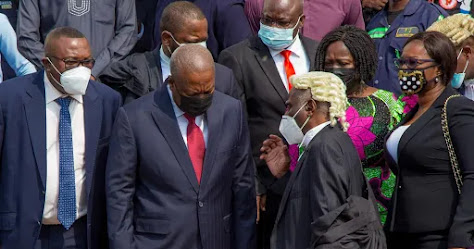In this piece, I shall catalogue the key arguments made by proponents of the bill and address them from a legal and governance policy perspective for the purposes of public education.
1. Proponents of the bill
argue in the memorandum to the bill that LGBTQ+ and related activities are not consistent with Ghanaian traditional and
cultural values. Therefore, the clauses in the bill which place excessive restrictions
on basic rights guaranteed by Ghana’s constitution such as the right to
privacy, free expression, association, non-discrimination, personal autonomy,
amongst others are justified.
Response: Under Ghana’s Constitution, culture is NOT used to
determine whether rights are allowable. Rather, custom is assessed on the basis of whether
it infringes rights guaranteed by the Constitution. Chapter 5 of the
Constitution which guarantees basic rights and proceeds to provide the
circumstances under which these rights could be restricted makes no provision
for the restriction of rights on the basis of 'traditional Ghanaian customs,
beliefs and values' (see Article 21 of the 1992 Constitution).
2. In the memorandum to the
bill, the sponsors of the bill argue that LGBTQ+ persons and related activities threaten the
concept of family and the associated value systems that are central to the
social structure of all ethnic groups in Ghana.
Response: Under Ghanaian law, LGBTQ+ persons are excluded
from the institution of marriage [see Marriages Act, 1885-1985 (CAP 127)]. It’s therefore
strange how anyone could suggest that they pose a threat to marriage and family
life. Beyond this mere
assertion, proponents of the bill do not demonstrate in what ways LGBTQ+ persons represent a threat to family or to marriage. All
LGBTQ+ persons ask is to be left alone. How that constitutes a threat to family life is yet to be explained by the proponents of the bill.
3. Proponents of the bill
justify the restrictions placed on basic rights on the ground that rights are not absolute. Therefore, the rights of
LGBTQ+ persons are ‘restrictable’. According to them, the State's
power to restrict rights is demonstrated in the passage of the Cybersecurity
Act, 2020 (Act 1038) which permits reasonable restrictions on the right to
privacy, and the Vigilantism and Related Offences Act, 2019 (Act 999) which
proscribes the formation of groups for the furtherance of interests by the use
of threat of violence or intimidation.
Response: Of course, rights are not absolute. But neither is
the power of the State to restrict rights absolute. The State must show sound
public interest or public policy justification for restricting a right. No such
justification has been provided by the proponents of the bill for the excessive
restrictions on the rights of LGBTQ+ persons and or persons who may want to
advocate for the rights of this minority group. Under the 2 statutes cited (Act 1038 and Act 999), the public interest justification for the
restrictions placed on rights to privacy and association is national security. For instance, in the case of the Vigilantism Act,
our experience as a country has shown that if left unchecked, 'vigilantism' has
the propensity to create far-reaching social chaos and disrupt public law and
order. The violence that characterised the 2016 and 2020 general elections are enough proof of the need for such a law criminalising
‘vigilantism’. Unlike these two statutes
which provide national security as a sound justification for the restrictions
placed on the above-mentioned rights, the anti-gay bill provides no such public interest
grounds for restricting rights to privacy, free expression, personal autonomy,
non-discrimination, association, etc.
4. Proponents of the bill also justify it by expressing a public health concern. They cite a 2017 report of the Science Research Council which says that about 18.1% of people living with AIDS are men who sleep with men. They then proceed to single out LGBTQ+ persons and their activities for criminalisation.
Response: In citing this data, the proponents of the bill fail to realise that on
its flip side, this very statistic means that roughly four-fifths (81.9%) of persons living with HIV/AIDS cases bear no
relationship to LGBTQ+ persons. They fail to demonstrate how LGBTQ+ persons infringe on the rights and
freedoms of others or how the private sexual or amorous relations of mutually
consenting adults of sound mind, whether heterosexual or same-sex, pose a public health threat.
Instead of focusing exclusively on LGBTQ+ persons, proponents of the bill should concern themselves with the social costs and health consequences of all forms of sexual
behavior—whether between heterosexuals or
LGBTQ+ persons. The appropriate
public policy response then is not to criminalise LGBTQ+ persons or their
activities, but an intervention that ensures that all potentially sexually
active persons, whether LGBTQ+ or heterosexual, are provided adequate and
appropriate education on responsible sex or sexual behaviour as well as access
to medical advice and care.
In a democratic dispensation where the rights of all
persons, including social minorities, are guaranteed under the Constitution,
any legislation seeking to target and single out LGBT+ persons or gay rights
advocates for such unfair treatment further marginalises and victimises them
and sets a dangerous precedent for the treatment of unpopular minorities in
general. The proponents of this anti-gay bill need to understand that treating
other persons unfairly does not guarantee equal justice for anyone.








